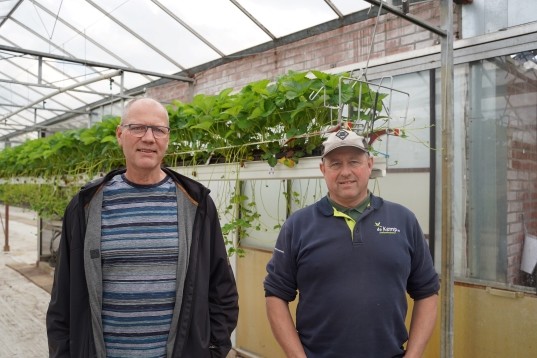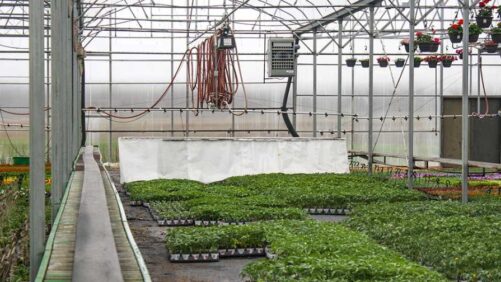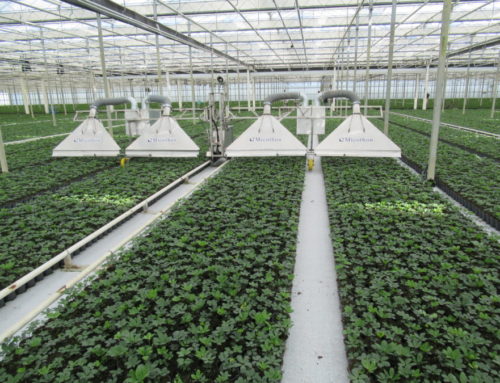Propagation company De Kemp in Meterik, North Limburg, does everything it can to grow disease-free starting material. A ‘preparatory year’ with Tagetes or Japanese oats has become standard, with plenty of work being done with compost, rock flour and a variety of trace elements. “We strive for sustainable and resilient cultivation with the cleanest possible start,” Martin de Klein, responsible for crop protection and fertilization, explains the company’s course in Bayer’s Strawberry Courier.

It is mid-May and the sun has barely made an appearance for a few weeks. And the temperature has not risen above 15 degrees for days. “No, things are not going so fast on the field and in the greenhouse. I think we are a week or two behind in growth. But oh well, with a bit of nice weather that will soon be overtaken,” says Martin de Klein, while discussing the start of the season with advisor Henk Ritter van Mertens.
Ritter also sees no adverse effects of the slow start. “We should not compare everything with previous years. It was very dry then, but now we are fairly close to normal.”
According to both men, there is still little to worry about with regard to diseases and pests. “The only concern we now have is the wind damage caused by the flapping of the foil,” says De Klein. “That can be an entry point for diseases. In the coming days, it is therefore especially important to pay attention and work under conditions that are as dry as possible.”
Focusing on resilient crops
De Kemp tries to focus as much as possible on a sustainable cultivation method with resilient crops. For example, about 50 hectares of land are prepared annually for propagation cultivation in the following year. In that ‘preparatory year’, the soil receives maximum attention.
In addition to a sophisticated fertilization with organic manure, compost and rock flour, Tagetes or Japanese oats are also sown to keep nematodes (P. Penetrans) under control. According to De Klein, these preparations increasingly pay for themselves in propagation crops. “We notice that our crops are stronger, more resistant to diseases and pests. This means that we can step back in the use of chemistry step by step. That is not a goal in itself for us, but it is a way to be prepared for a future with increasingly less chemicals.”
De Klein says he learns a lot from organic cultivation, which is becoming an increasingly important part of the company. “We are therefore even more aware of the soil than before. On the one hand, that is very unruly matter, but at the same time also a very nice challenge!”

Starting with the cleanest possible starting material also has high priority within the company. De Klein explains that about 50 plants of all 15 cultivated strawberry varieties are selected and grown and further propagated as pre-basic material in aphid-free greenhouses. This produces about 20,000 ‘spotless’ plants per variety.
“Chemistry still badly needed”
Although, according to De Klein, ‘a lot can already be done without chemistry’, he emphasizes that conventional propagation cultivation cannot yet do without chemistry. This is partly due to the variety range – in which characteristics such as production and quality (for the time being) carry more weight than resistance to diseases and pests. Another factor is that in conventional cultivation, higher demands are made on starting material. While ‘a few percent’ loss is still acceptable in organic planting material, the conventionally produced plants must be 100% good, Martin knows.
A disease for which chemical agents are still very much needed is Phytophthora. “Together with powdery mildew and spider mite, Phytophthora is one of the most important diseases in the cultivation and propagation of strawberries. Only powdery mildew and spider mites can usually be tackled with the current range of products, while the control of late blight has become increasingly difficult in recent years. sensitive varieties such as Malling Centenary, Malling Allure, Polka and Sonata, it is difficult to keep the fungus under sufficient control”, advisor Ritter explains the current situation.
For more information:
Stefan van Heist
Bayer Crop Science
www.agro.bayer.nl












